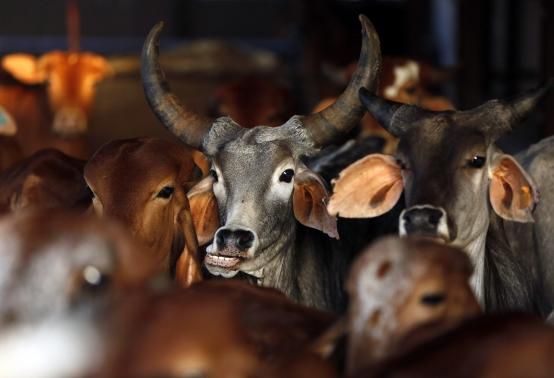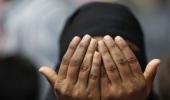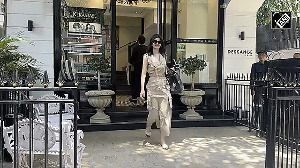'As far as I know, the Quran does not say anything of this sort (as claimed by the government board). It is a different thing that all the ancient Muslim leaders believed that cows should not be killed if it hurts the sentiments of other people,' said former member of Parliament Shahid Siddiqui.

Billboards with pictures of Gujarat Chief Minister Anandiben Patel and the Islamic symbol of the crescent moon and star have cropped up across an Ahmedabad locality. What comes as a surprise is the message from the Gauseva and Gauchar Vikas Board of the Gujarat government, quoting a verse it claims is from the Quran, to back its case for cow protection.
The verse on the billboard, 'Akramul bakra fainaha saiyedul bahaima', has been translated as 'show respect to cows, as it is the leader of all bovines. Its milk, ghee and butter have therapeutic properties and its meat is the cause of several diseases.''
The billboards were put up in the Bapunagar locality to extend greetings to Muslims on the occasion of Janmashtami, celebrated on Sunday.
According to the Gauseva and Gauchar Vikas Board website, the Gauseva Ayog, created in 1999 and expanded to the Gauseva and Gauchar Vikas Board in 2012, was 'established for preservation, development and welfare of the cow and its progeny'. It is under the aegis of the agriculture and cooperation department of the Gujarat government.
Board chairman and former Union minister Dr Vallabhbhai Kathiria told the Indian Express: ‘I got the verse and its translation from a 20-page booklet in Hindi and Gujarati.’
Shahid Siddiqui, a former member of Parliament on Tuesday, however, rubbished the claims of the Gujarat government board. But, he mentioned what the Quran “actually said about cows”. "The Quran says that milk-giving animals must not be cut," added Siddiqui.
"As far as I know, the Quran does not say anything of this sort (as claimed by the government board). It is a different thing that all the ancient Muslim leaders believed that cows should not be killed if it hurts the sentiments of other people," he concluded.
Mufti Ahmed Devlavi, a member of the All India Muslim Personal Law Board, told the Indian Express, ‘I have never come across such a verse in the Quran. It is possible that it may be an Arabic statement, wrongly attributed to the Quran. It appears to have been used to mislead Muslims.’
With inputs from ANI











 © 2025
© 2025